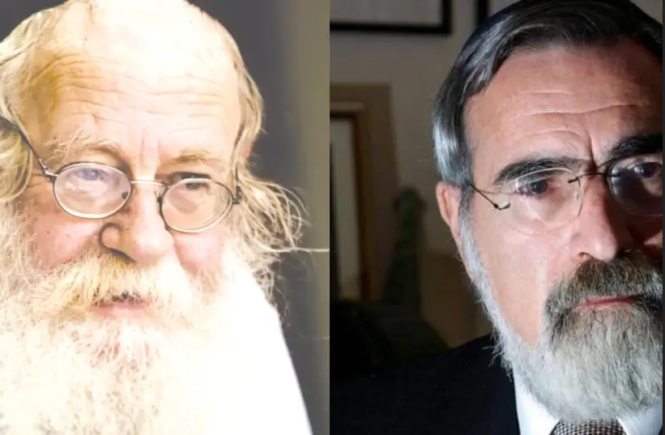In the most recent month, two Jewish monsters left us: Rabbi Adin Steinsaltz-Even Yisroel, and Lord Rabbi Jonathan Sacks. Each in their own particular manner had an incredible effect on the Jewish public and their general surroundings.
Rabbi Steinsaltz’s momentous scholarly abundance included opening the Talmud with his memorable interpretation. He created many works, remembering an advanced critique for the Torah synergizing traditional grant with contemporary experiences.
Rabbi Sacks’ quality was in associating two universes: the profundity of Jewish grant and contemporary idea. He had the option to connect the mainstream stronghold of Oxford and the universe of Torah, turning into a lucid representative of Judaism to Jews and non-Jews, even on the wireless transmissions of the BBC.
Both didn’t fit the regular Jewish strict shape. While proceeding to stay focused on Halacha, Jewish law, they had the option to reach past the universe of Orthodox Judaism and effect the more extensive society.
They shared the nature of independence. Steinsaltz was the exemplary enfant awful, continually ready to challenge customary idea. A few years back, I coordinated the National Conference on Jewish and Contemporary Law featured by Rabbi Steinsaltz and previous US Supreme Court Justice Antonin Scalia.
At the whole meeting, with about 600 lawyers present, Steinsaltz tested the crowd by beginning the meeting saying, “Attorneys resemble whores,” suggesting they would take any customer regardless of their own standards. His expectation was to incite consideration and reflection. In each experience with him, I knew there would be a snapshot of stun, not in a malicious design, but rather as a push to think
Sacks was additionally his own man. He didn’t adhere to the standard yeshiva training, and his works uncover a spearheading scholarly soul that stirs things up. As his girl Gila expressed in a tribute at the burial service, her dad educated “that individuals, each particularly in the picture of God, were to be people with their own characters.”
His latest and, unfortunately, last book, Morality, contends that Western culture has lost its direction, getting untethered to virtues. He kicked the standard by utilizing prime contentions made by present day rationalists rather than lessons of Torah. Nonetheless, it was this methodology that maybe had a superior possibility for his message to resound past the limited universe of customary Judaism.
You can follow their solid independence to the essential coach and educator in both of their carries on with: the Lubavitcher Rebbe, Rabbi Menachem Mendel Schneerson. Steinsaltz was an impassioned hassid. Brought into the world a common Jew, he discovered his approach to Judaism and took off to scholarly statures. He composes as such in his life story of the Rebbe, My Rebbe, which is even more an individual journal about his profound enthusiastic association with him.
Sacks was a Chabad individual voyager, not viewing himself as an undeniable hassid, however an individual whose life decisions had been outlined by the Rebbe’s recommendation – powerfully uncovered by the tune he chose to be sung at his last goodbye, his burial service: the incredible hassidic tune, “Tzamah Lecha Nafshi” (“My Soul Thirsts for You”), a serious profound song mirroring the internal longing of the spirit.
Plainly the Rebbe encouraged every one of their distinctions. What’s more, this is the contrast between the Rebbe’s mentality and the methodology of a significant part of the haredi (super Orthodox) people group. Haredi outreach looks to attract individuals to recognition with the objective of finding a way into the conventional world and form. The Rebbe’s goal was for the individual to understand their own potential inside the structure of Torah and convention.
The Rebbe pushed Sacks to turn into a rabbi for rabbis and afterward to become boss rabbi, not to have “his protegé in the position,” but since it was best for the Jewish public. From the mind-boggling overflowing of recollections of, accounts about, and pearls of insight from Rabbi Sacks via online media as of late, this was unmistakably accomplished.
A few years back I went to a little gathering of rabbis with Rabbi Sacks. A short time later, I met him and his significant other, Elaine, in the lift. I reviewed to them my memory of him going to my Yeshiva in Kfar Chabad Israel for a couple of months. We, the understudies, were energized when this star understudy from Oxford University had shown up. In spite of the fact that a portion of the rabbis attempted to persuade him to remain, he got back to his investigations in England.
At that point I jested, “You’re fortunate you left the Chabad yeshiva. On the off chance that you hadn’t, rather than being boss rabbi, you would be running a Chabad House in South London.” Rabbi Sacks and his significant other thundered with giggling. What was clear is that the Rebbe needed Rabbi Sacks to be Rabbi Sacks, to change the world in the manner in which he could do best, and that was not really by turning into a Chabad shliach (messenger).
The equivalent is valid with Rabbi Steinsaltz. He took a lot of analysis for his novel, nontraditional style. Some portion of that was energized by specific rabbis with an animus toward Chabad at that point, and part of it as a result of his unmistakable way to deal with learning and grant that didn’t find a way into the customary yeshiva shape. Here as well, it was the Rebbe who pushed him forward, to disregard his doubters, and keep on making extraordinary commitments to Jewish learning in the manner that no one but he could.
The Rebbe did nothing less with his own hassidim, pushing them to arrive at their own extraordinary potential and not just become dark hatted clones of a specific model; to understand their own exceptional otherworldly endowments.
The fearlessness of Rabbi Sacks and Rabbi Steinsaltz to take advantage of the intensity of their uniqueness, to utilize their uncommon otherworldly endowments to interface more to Torah and the Divine, is an exercise we would all be able to learn. They never settled on lessons of the Torah, or sabotaged halachic recognition. In any case, each in his own specific manner, by being solid individualists, elevated and roused untold numbers.




